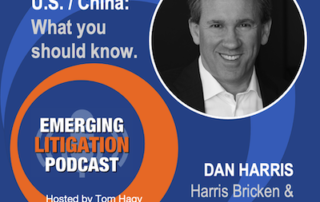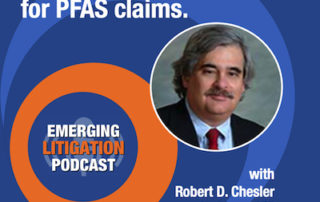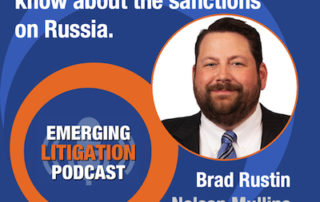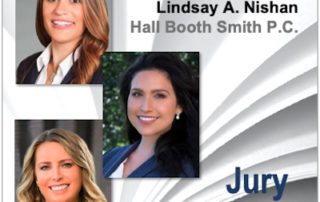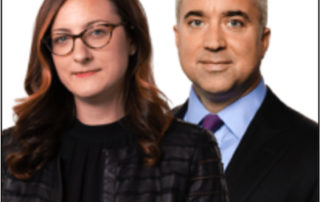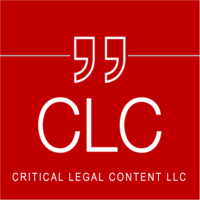
Emerging Litigation Podcast
What Businesses and Lawyers Should Know About the U.S./China Relationship
Our Guest Dan Harris is a leading authority on the legal and strategic aspects of conducting business in emerging markets. He is co-founder of the international practice of Seattle-based HarrisBricken, which has offices across the U.S., as well as in China, Spain, Mexico, and Brazil. His China Law Blog was named, and with good reason, to the ABA Journal’s “Blawg Hall of Fame.” Forbes, Business Week, Fortune, The BBC, The Wall Street Journal, The Washington Post, The Economist, CNBC, The New York Times, and many other major media players have looked to him for his perspective on international law issues. Dan writes and speaks extensively on international law with a focus on protecting businesses in their foreign operations and he has had the rare honor of being designated a “Super Lawyer.” He is also a member of the Editorial Board of Advisors for the Journal on Emerging Issues in Litigation and the Emerging Litigation Podcast. What Businesses and Lawyers Should Know About the U.S. / China Relationship “Americans mistakenly believe that China operates as a rational economic actor and that economics is their highest priority. It’s not and it never has been. Their highest priority is whatever is good for the Chinese Communist Party.” “Chinese companies view American and EU companies as very risky, in large part because so many American and EU companies are looking to move their manufacturing out of China.” A major potential avalanche of risks are those that would shake the business world should – as some expect it will – trade relations between China, and America and EU, come to an end. China is America’s largest trading partner, a relationship responsible for $600B a year in commerce, according to the Office of the U.S. Trade Representative. By comparison, U.S. / European Union trade exceeds $1T. The trade [...]
Insurance Coverage for PFAS Claims
PFAS Insurance Coverage with Robert D. Chesler of Anderson Kill Listen to my interview with Anderson Kill's Robert D. Chesler, a preeminent expert on insurance coverage law especially in the context of highly complex long-tail claims scenarios involving multiple parties and events that can span decades and always cost many millions of dollars. Considered by many to be an insurance guru on these cases -- as well as on D&O, cyber and privacy, and intellectual property insurance -- Bob holds a Ph.D. and masters degree from Princeton University, and a J.D. (cum laude) from Harvard Law School. This podcast is the audio companion to the Journal on Emerging Issues in Litigation, and Bob is one of our most valued editorial advisors. The Journal is a collaborative project between HB Litigation Conferences and the Fastcase legal research family, which includes Full Court Press, Law Street Media, and Docket Alarm. The podcast itself is a joint effort between HB and our friends at Law Street Media. If you have comments or wish to participate in one our projects, or want to tell me how much you learned from Bob, please drop me a note at Editor@LitigationConferences.com. Tom Hagy Host and Litigation Enthusiast P.S. The fact that I make myself laugh during these interviews probably has less to do with the subject matter (most definitely, is more precise) or my sense of humor, and more to do with cabin fever. Or I'm just nuts. The PFAS family of chemicals is one stubborn bunch. They are a class of man-made products dubbed "forever chemicals," because of the difficulty of removing them from the environment, humans, and other animals. They are also at the center of sprawling litigation around the country involving alleged property damage, water contamination, and bodily injury. More than 1,500 cases are consolidated in closely-watched multi-district litigation in federal court in South Carolina. Listen to [...]
The Impact of Sanctions on Russia on Global Financial Markets with Brad Rustin
The Impact on Global Financial Systems of U.S. Sanctions on Russia with Brad Rustin But what risks do American corporations and financial institutions face in light of these measures? What difficult reverberations will companies feel across the world? What should global businesses and FinTechs be doing right now to avoid, among other things, violating the restrictions imposed by the U.S. Treasury Department’s Office of Foreign Assets Control (OFAC)? What role will cryptocurrency play in all of this? Also, do institutions whose data are stored in Russia and Ukraine face an additional risk as a parallel (albeit less horrific) battle rages on in cyberspace? Listen to my interview with Brad Rustin, a partner with Nelson Mullins Riley & Scarborough LLP and chair of the firm’s Financial Services Regulatory Practice. Brad is a highly regarded FinTech law and industry expert. This will be apparent when you listen. Brad is also on the Editorial Advisory Board of the Journal on Emerging Issues in Litigation. This is a special rapid-release episode given we feel the insights Brad shares are insights business and FinTech’s -- and their attorneys -- urgently need to hear. This podcast is the audio companion to the Journal on Emerging Issues in Litigation, a collaborative project between HB Litigation Conferences and the Fastcase legal research family, which includes Full Court Press, Law Street Media, and Docket Alarm. The podcast itself is a joint effort between HB and our friends at Law Street Media. If you have comments or wish to participate in one our projects, or want to tell me how much you learned from Brad, please drop me a note at Editor@LitigationConferences.com. Tom Hagy Host and Litigation Enthusiast P.S. We did not get to discuss Russia’s retaliatory sanctions against President Biden, his son, Hunter, and Hillary Clinton. No word on sanctions against the Biden dogs. Oh! This just in from People magazine: “Hillary Clinton Thanks Russia for 'Lifetime [...]
A Shameless Plug for Our Content Services
Your content marketing is everything you’ve ever dreamed of. Right?

Critical Legal Content was founded by Tom Hagy, former Editor & Publisher of Mealey’s Litigation Reports and VP at LexisNexis, founder of HB, current litigation podcaster and editor-in-chief. CLC’s mission is to help smaller firms and service providers not only create content — blogs, articles, papers, webinars, podcasts (like the stuff on this site) — but also to get it out there. How? Via social media, this website, your website, and potential via our podcast and journal which we publish in collaboration with vLex Fastcase and Law Street Media. The goal is to attract readers and dizzy them with your brilliance.
*Inspired by actual events.
Create content like a real legal publisher.
Journal on Emerging Issues in Litigation
Robojudges: If Machines Could Make Judicial Decisions, Should They?
The Author A leading academic and practitioner, Joshua P. Davis (davisj@usfca.edu) is a nationally recognized expert on legal ethics and class actions, as well as on artificial intelligence in the law, antitrust, civil procedure, free speech, and jurisprudence. He has published more than 30 scholarly articles and book chapters on these subjects and is currently writing a book on AI titled Unnatural Law, which will be published by Cambridge University Press. He is Research Professor of Law at the University of California Hastings College of Law, and a Shareholder of the Berger Montague PC law firm and Manager of its new San Francisco Bay Area Office. Before taking these posts, for more than 20 years Davis was a tenured Professor of Law at University of San Francisco Law School, where he also served as the Director of the Center for Law and Ethics. Davis is also a member of the Editorial Board of Advisors for the Journal on Emerging Issues in Litigation, published by Fastcase Full Court Press. Tom Hagy, Editor in Chief. You can also listen to Josh on the Emerging Litigation Podcast! Robojudges: If Machines Could Make Judicial Decisions, Should They? By Joshua P. Davis Abstract: As artificial intelligence makes its way into every aspect of our daily lives—including the practice of law—humans have some decisions to make. Do we wish for AI to replace human judges? What are the risks and how might they be mitigated? What breakthroughs need to occur? How might robotic judges, or “robojudges,” perform better than human jurists? What surprises might be in store? Read on for the author’s perspectives on these important questions. After all, as he points out, AI is already being used by the judiciary, albeit to a limited extent. Some of the most exciting, vexing, and terrifying issues at the intersection of [...]
Going Viral or Going Nuclear: Social Inflation’s Impact on Jury Verdicts …
The Authors All three authors are with the law firm of Hall Booth Smith, P.C., and concentrate on various aspects of healthcare defense. Lindsay A. Nishan (lnishan@hallboothsmith.com) is an Associate in the HBS Charleston office. Samantha Bowen Myers (smyers@hallboothsmith.com) is an Associate in their West Palm Beach, Florida, office. Sandra Mekita Cianflone (scianflone@hallboothsmith.com) is a Partner in the firm’s Atlanta office. She is also a member of the Editorial Board of Advisors for the Journal on Emerging Issues in Litigation, and a frequent contributor to the Emerging Litigation Podcast. Going Viral or Going Nuclear: Social Inflation’s Impact on Jury Verdicts and How to Safeguard Against It By Lindsay A. Nishan, Samantha B. Myers and Sandra M. Cianflone A juror’s perception of companies and healthcare providers is increasingly colored by TV and social media. The same is true for their understanding of the practice law or medicine, which may be as wrong as it is immovable. “Social inflation” refers to rising litigation costs and the resulting higher insurance payouts which drive up the cost of insurance. In this article the authors, each of whom represents parties in the healthcare industry, discuss the evolving social trends that lead jurors to render “nuclear verdicts,” and what attorneys should consider in mitigating the effects of this phenomenon. Social media feeds today are crammed with flashy advertisements from lawyers promising big-dollar settlements against “rich insurance companies.” The number of these commercials has spiked since the 1970s as the phenomenon known as "social inflation" has taken root in the legal system. Social inflation is a term of art that refers to rising litigation costs, the impact those costs have on insurance claim payouts, and how much the average policyholder is expected to pay for basic coverage. Recently, the term social inflation has taken on a new meaning as it has [...]
Can we rely on shareholders to compel corporations to meaningfully act on ESG issues? | By Rebecca Boon and John Rizio-Hamilton | Bernstein Litowitz Berger & Grossmann
The Authors Rebecca Boon has been litigating securities fraud and shareholder rights actions for over a decade, recovering more than $1.5 billion for the firm’s institutional investor clients. Her work at the firm expands beyond litigation. Rebecca has advanced equality in the workplace by co-founding the Beyond #MeToo working group and leading landmark recoveries that have resulted in hundreds of millions of dollars back to investors and important social change among industries. Contact: rebecca.Boon@blbglaw.com John Rizio-Hamilton is one of America’s top shareholder litigators. He works on the most complex and high-stakes securities class action cases, and has recovered billions of dollars on behalf of institutional investor clients. John led the trial team that recovered $240 million for investors in In re Signet Jewelers Limited Securities Litigation, a precedent-setting case that marks the first successful resolution of a securities fraud class action based on allegations of sexual harassment. Contact: johnr@blbglaw.com Can we rely on shareholders to compel corporations to meaningfully act on ESG issues? By Rebecca Boon and John Rizio-Hamilton This article was first published in the Responsible Investor, Aug., 10th, 2021. Posted with permission of the authors. Copyright 2021 by Rebecca Boon & John Rizio-Hamilton. All rights reserved. There is an ongoing debate about the role that regulators should take regarding corporate obligations and accountability for ESG issues. Earlier this year, the Ontario Capital Markets Modernization Taskforce weighed in with its long-anticipated recommendation on diversity quotas for corporate boards. After receiving significant industry feedback, the Ontario Taskforce changed its initial recommendation from a requirement that public companies meet specific diversity targets, to allowing companies to set their own targets, report them, and develop a timeline for implementation. This ‘market-based’ framework for diversity would rely on investors to push corporations and hold them accountable. There was significant backlash when the Ontario Taskforce changed its initial recommendation. It was [...]
